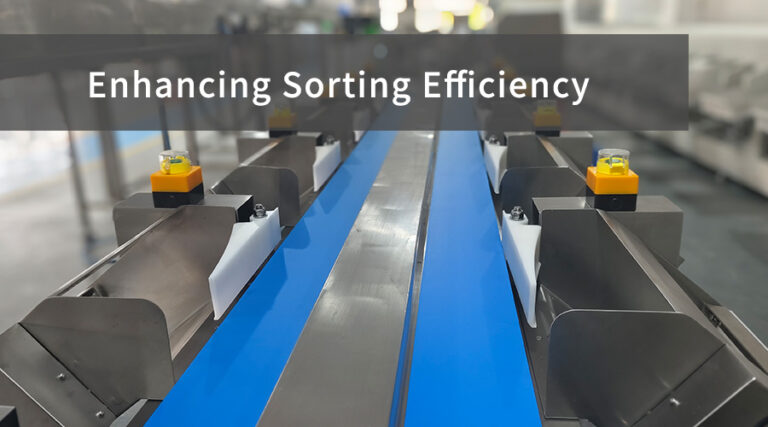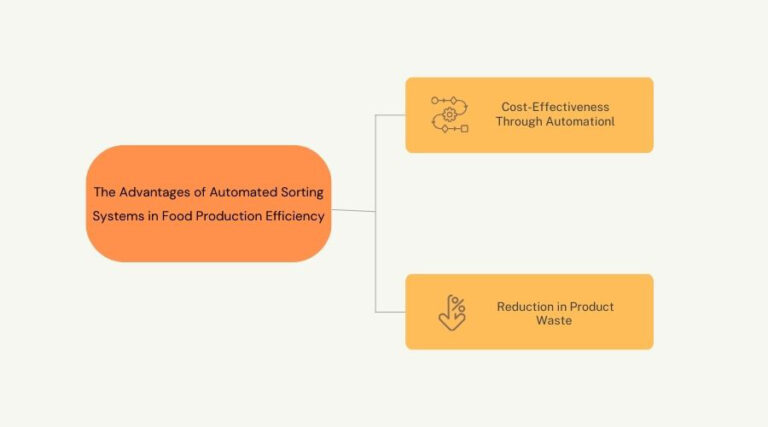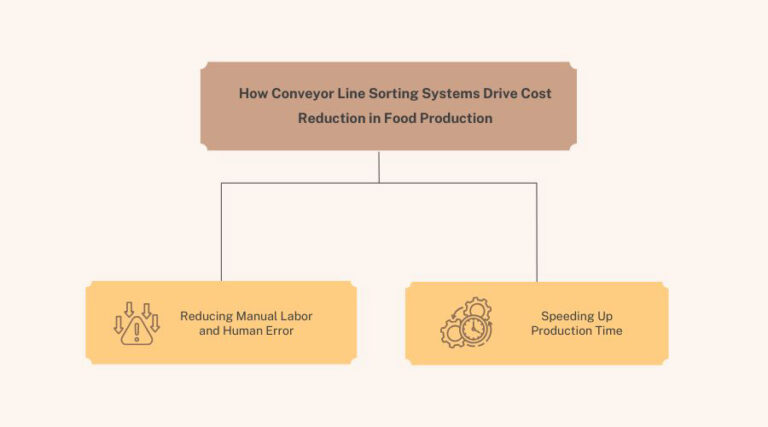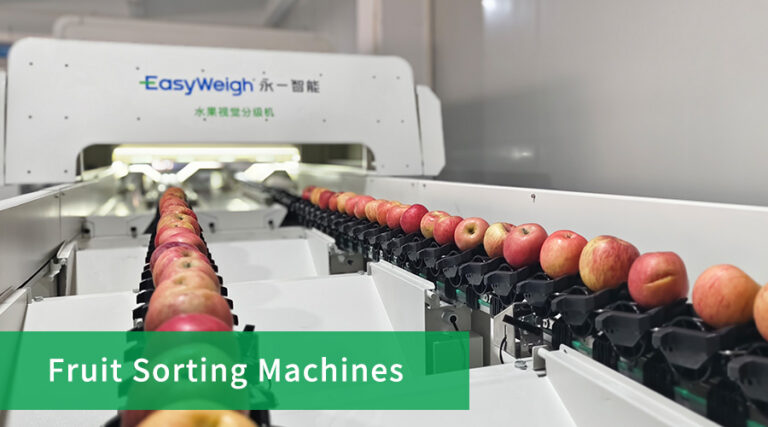Introduction
In today’s competitive food production industry, efficiency is crucial for profitability. One of the most effective ways to enhance operational efficiency and reduce costs is by utilizing food sorting machines. These machines automate the sorting process, which has traditionally relied heavily on manual labor, offering numerous benefits to food producers. From nut sorting to cold shrimp sorting, as well as potato sorting machines, sorting technology is revolutionizing the operations of food production facilities by significantly lowering production costs.
This blog will explore how food sorting machines can help reduce operational expenses and improve overall production efficiency. We will examine various types of sorting systems, including automated sorting machines and conveyor line sorting systems, and how they contribute to cost savings. Let’s explore the various ways these technologies streamline food production.
What Is Sorting and How Does a Food Sorting Machine Impact Production Costs?
In the context of food production, sorting refers to the process of categorizing or separating products based on specific characteristics such as size, color, weight, and quality. For instance, in food processing, fruits are often sorted by ripeness, color, or size to ensure that only the highest-quality produce is delivered to consumers. Food sorting machines automate this process, providing significant advantages over traditional manual sorting methods.
The Impact on Labor Costs
One of the main advantages of using food sorting machines is the reduction in labor costs. Traditionally, sorting required manual intervention, which not only took a significant amount of time but also introduced the potential for human error. This increased the likelihood of defective or subpar products entering the supply chain, resulting in wasted time and material costs.
In contrast, automated sorting machines are designed to operate continuously and accurately, performing tasks that would typically require multiple human workers to complete. By automating the sorting process, businesses can significantly reduce labor costs while enhancing the accuracy of their sorting operations.
Enhancing Sorting Efficiency

Incorporating a sorting machine into the production process significantly accelerates the sorting workflow compared to manual labor. Advanced sorting systems, equipped with sensors and cameras, can quickly identify product characteristics and process large volumes of items rapidly. By automating repetitive tasks, these machines reduce downtime, enable faster product turnover, and improve overall production speed—all of which contribute to lower costs.
The Advantages of Automated Sorting Systems in Food Production Efficiency

Automated sorting systems, such as auto sorting machines and machine sorting technologies, are essential for enhancing production efficiency in the food industry. These systems utilize advanced technologies, including infrared sensors, vision inspection and color detection, to sort products based on specific characteristics. This ensures greater accuracy and faster processing times.
Cost-Effectiveness Through Automation
Investing in automated sorting systems can lead to significant long-term savings for companies. By reducing the reliance on manual labor, businesses can save on wages and related overhead costs. Moreover, these automated machines improve accuracy, resulting in fewer products being wasted due to improper sorting, which directly lowers material expenses.
For instance, consider a food sorting system in a processing plant. Without automation, employees may need to manually sift through thousands of food items, resulting in fatigue, inefficiencies, and errors. In contrast, automated systems can operate continuously, delivering consistent performance and reducing production times.
Reduction in Product Waste
One major contributor to high production costs in the food industry is product waste. Products that are incorrectly sorted and do not meet quality standards are often discarded or repurposed. Food sorting machines can significantly reduce this waste by sorting products with high precision. For example, fruit sorting machines quickly separate overripe or damaged fruits, preventing them from entering the production line and being wasted.
How Conveyor Line Sorting Systems Drive Cost Reduction in Food Production

In large-scale food production, integrating conveyor line sorting systems can significantly enhance operational efficiency. Conveyor lines transport products through various stages of the production process, and adding sorting capabilities allows for the automatic identification and categorization of products. This automation speeds up the entire process, ultimately reducing production costs.
Reducing Manual Labor and Human Error
Manual sorting on conveyor lines is not only slow but also prone to errors, particularly when sorting products with varying sizes, shapes, and weights. The introduction of automated conveyor line sorting systems eliminates these issues by automating the sorting process and reducing reliance on human labor.
With the use of machine sorting and auto sorting machines, products are sorted based on preset criteria, which reduces human error and the chances of defective products. The result is a higher-quality output and fewer errors in sorting, leading to a more efficient production process.
Speeding Up Production Time
Conveyor lines equipped with sorting systems can process products much faster than manual labor. The continuous flow of products ensures that each item is sorted promptly and accurately. This rapid processing enables companies to meet higher demand without increasing labor or production costs, resulting in faster production cycles.
Food Sorting Machines for Specific Products: From Potato Sorting to Cold Shrimp Sorting
One of the key advantages of food sorting machines is their ability to handle specialized products with precision and accuracy. These machines can be customized to sort specific types of food, such as nuts, cold shrimp, and fruits, each with unique sorting requirements.
Potato Sorting Machines
Potato sorting machines automatically classify potatoes based on size, weight, and quality. These machines play a crucial role in the potato processing industry, as size and quality have a significant impact on product pricing. By utilizing automated sorting equipment, companies can optimize yield and reduce waste. This ensures that only the best potatoes are used in production, while also lowering costs associated with disposing of inferior products.
Cold Shrimp Sorting

Sorting cold shrimp involves categorizing them based on size, weight, and quality. Shrimp sorting machines automate this process, enabling faster and more accurate sorting while minimizing the labor costs associated with manual sorting. By utilizing these automated systems, seafood producers can improve product quality, reduce labor costs, and minimize waste.
Fruit Sorting Machines

Fruit sorting machines are designed to separate fruits based on characteristics such as size, color, ripeness, and other qualities. For example, apples and oranges can be sorted by size and color to meet market requirements. Automated sorting machines offer higher precision compared to manual sorting, ensuring that only premium-quality fruits are packaged for sale, which ultimately increases the overall profitability of the production line.
Nuts Sorting
In industries that process nuts, it is crucial to sort them effectively in order to separate damaged, discolored, or inferior-quality nuts from those that meet desired standards. Nuts sorting machines utilize advanced imaging systems and sensors to detect imperfections, allowing for accurate sorting. This process prevents the shipment of defective products, ensuring that only high-quality nuts reach customers, thereby reducing waste and associated costs.
Conclusion
Food sorting machines are transforming the food production industry by significantly lowering production costs. By automating the sorting process, these machines eliminate the need for labor-intensive manual sorting, enhance accuracy, reduce waste, and accelerate production cycles. Whether sorting nuts, cold shrimp, potatoes, or fruits, sorting machines enable businesses to save money while ensuring the highest quality standards for their products.
Investing in advanced sorting technology allows food production facilities to achieve substantial cost savings, boost efficiency, and maintain consistent product quality. If you’re considering an upgrade to your food sorting operations, explore Easyweigh’s sorting solutions for customized, cost-effective machines tailored to meet your production needs.
FAQs
How does the use of sorting machines lower labor costs?
Sorting machines automates the simple process of sorting products to help increase efficiency and lower costs on the job.
Are sorting machines the same for all industries?
Yes, there are sorting machines that can be used in a variety of industries, including food, agriculture, pharmaceuticals and recycling.
How optical sorting determinates of defects of work?
Optical sorters are advanced machines equipped with cameras and sensors, they scan the product and identify imperfections such as abnormalities in size or colour, as well as foreign matter.






